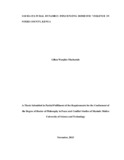| dc.description.abstract | Domestic violence is a violation of human rights and should not be condoned. Nyeri County has experienced tremendous development, and therefore, changes in terms of education, occupation, economic activities, making it one of the richest counties in Kenya. With these changes in society, there is high level of education, strong cultural adjustments, economic endowment, and the expectation is that there should be harmony in the homes. To the contrary, there is a lot of domestic violence as captured by scholars and the media. Therefore, this study intended to answer the question “why” by interrogating the influence of socio-cultural dynamics on this domestic violence. The specific objectives of the study were to: Examine the nature of domestic violence; evaluate the nexus between socio-cultural dynamics and domestic violence; and assess the challenges and opportunities resulting from domestic violence in Nyeri County, Kenya. The study was underpinned by the frustration-aggression theory and the social learning theory. Descriptive and evaluative research designs were used. The study was conducted in Nyeri County which has a population of 759,164. The study used random, purposive, convenience and census sampling techniques. The following respondents were sampled to participate in the study: 384 household heads, 12 assistant chiefs, 15 police officers, 30 religious leaders, 12 NGOs/CBOs, 3 Sub-county administrators, and 20 village elders. Primary methods of data collection were questionnaires, interviews, focus group discussions, and observation. Quantitative data was analyzed using SPSS version 25 to give frequency distribution, means and percentages, and findings were presented using tables, graphs, and charts. Qualitative data was analyzed using thematic narrations, and findings were presented using narrations and descriptions. The results show that 84% of the respondents had witnessed violence, while 16% had not. According to the results, 67% of the perpetrators were men, while only 33% were females. Verbal insults are major form of domestic violence manifestation. Domestic violence also manifests through financial deprivation, psychologically and through female genital mutilation. The study found out that the main socio-cultural factors that influence domestic violence are chauvinism, gender role exchange, alcoholism, and the MAU MAU impact. Challenges to domestic violence include lack of political will 16%, modernity 15%, influence of social media 20%, societal victimization 29%, and high poverty levels 20%. There arises some opportunities to enhancing resolution of domestic violence such as boosting moral values, strengthening the justice system, enactment of social programs and sensitization, psychosocial support, boy-child empowerment, indigenous methods, intervention of religious leaders, intervention of police, community policing, and intervention by public administration. Generally, the study concludes that socio-cultural dynamics; alcoholism, chauvinism, change of gender roles, education levels, stereotypes, MAU MAU impact, and land inheritance issues influence domestic violence in Nyeri county; however, such changes in the society were expected to bring peace and harmony among families in Nyeri County, but unfortunately this is not the case. It is recommended that both men and women should be empowered in Nyeri County. Further, the study recommends that there should be sensitization in the study area to help people utilize the positive changes in the society such as high education levels to make a harmonious society instead of using it to fight among spouses. Also, the study recommends that the government, civil society, and the general public should work together to end domestic violence in the county as it is a major threat to human rights. | en_US |

